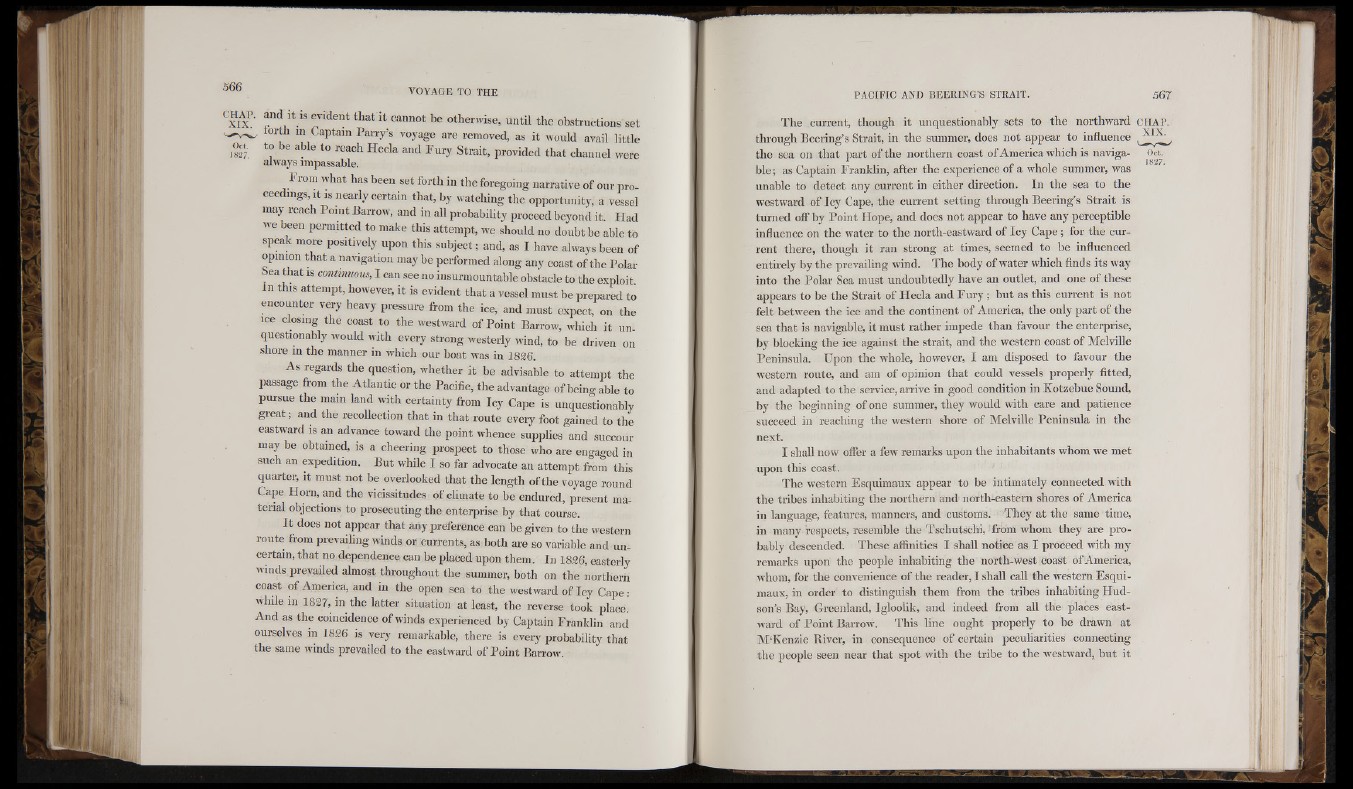
: i - 7
i l l '
, P i
CHA^P. and it is evident that it cannot be otherwise, until the obstructions set
Oct.
1827.
iorth in Captain Parry’s voyage are removed, as it would avail little
to be able to reach Hecla and Fury Strait, provided that channel were
always impassable.
From what has been set forth in the foregoing narrative of our proceedings
it IS nearly certain that, hy watching the opportunity, a vessel
may reach Point Barrow, and in all probability proceed beyond it. Had
we been permitted to make this attempt, we shoidd no doubt be able to
speak more positively upon this subject; and, as I have always been of
opinion that a navigation may be performed along any coast ofthe Polar
Sea that is contnmous, I can see no insurmountable obstacle to the exploit.
In tins attempt, however, it is evident that a vessel must be prepared to
encounter very heavy pressure from the ice, and must e.xpect, on the
ice closing the coast to the westward of Point Bar iw , which it unquestionably
would with every strong westerly wind, to be driven on
shore m the manner in which our boat ivas in 1826.
As regards the question, whether it be advisable to attempt the
passage from the Atlantic or the Pacific, the advantage ofbeing able to
pursue the mam land ivith certainty from Icy Cape is unquestionably
great; and the recollection that in that route every foot gained to the
eastward is an advance toward the point whence supplies and succour
may be obtained, is a cheering prospect to those who are engaged in
such an expedition. But while I so far advocate an attempt from this
quarter, it must not be overlooked that the length ofthe voyage round
Cape Horn, and the vicissitudes of climate to be endured, present material
objections to prosecuting the enterprise by that course.
It does not appear that any preference can be given to the western
route from prevailing winds or currents, as both are so variable and uncertain,
that no dependence can be placed upon them. In 1826, easterly
winds prevailed almost throughout the summer, both on the northern
coast of America, and in the open sea to the westward of Icy Cape:
while in 1827, in the latter situation at least, the reverse took place
And as the coincidence of winds experienced by Captain Franklin and
ourselves in 1826 is very remarkable, there is every probability that
the same winds prevailed to the eastward of Point Barrow.
The current, though it unquestionably sets to the northivard CHAP,
through Beering’s Strait, in the summer, does not appear to influence 7 7 ,
the sea on that part ofthe northern coast of Am erica which is navigable;
Oct.
1827.
as Captain Franklin, after the experience of a whole summer, was
unable to detect any current in either direction. In the sea to the
westward of Icy Cape, the current setting through Beering’s Strait is
turned off by Point Hope, and does not appear to have any perceptible
influence on the water to the north-eastward of Icy Cape ; for the current
there, though it ran strong at times, seemed to he influenced
entirely by the prevailing wind. The body of water which finds its way
into the Polar Sea must undoubtedly have an outlet, and one of these
appears to be the Strait of Hecla and Fury ; but as this current is not
felt between the ice and the continent of America, the only part of the
sea that is navigable, it must rather impede than favour the enterprise,
by blocking the ice against the strait, and the western coast of Melville
Peninsula. Upon the whole, however, I am disposed to favour the
western route, and am of opinion that could vessels properly fitted,
and adapted to the service, arrive in good condition in Kotzebue Sound,
by the beginning of one summer, they would with care and patience
succeed in reaching the western shore of Melville Peninsula in the
next.
I shall now offer a few remarks upon the inhabitants whom we met
upon this coast.
The western Esquimaux appear to be intimately connected with
the tribes inhabiting the northern and north-eastern shores of America
in language, features, manners, and customs. They at the same time,
iu many respects, resemble the Tschutschi, from whom they are probably
descended. These affinities I shall notice as I proceed with my
remarks upon the people inhabiting the north-west coast of iVmerica,
whom, for the convenience of the reader, I shall call the western Esquimaux,
in order to distinguish them from the tribes inhabiting Hudson’s
Bay, Greenland, Igloolik, and indeed from all the places east-
Ii'ard of Point Barrow. This line ought properly to be drawn at
M'Keiizie River, in consequence of certain peculiarities connecting
the people seen near that spot with the tribe to the westward, but it